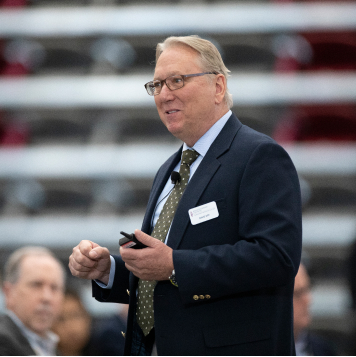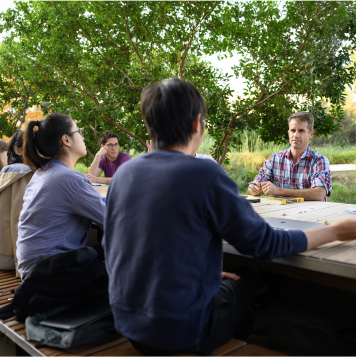
David Day, Professor and Academic Director at the Kravis Leadership Institute
CMC Recognized for Responsible Leadership
Claremont McKenna College is among the 25 inaugural recipients of the Carnegie Foundation Elective Classification for Leadership for Public Purpose, a formal recognition of the College’s campus-wide commitment to tackling complex societal issues and fostering a deeper understanding of leadership as a public good.
David Day, Claremont McKenna College Professor and Academic Director at the Kravis Leadership Institute, shepherded the four-year effort, which involved every aspect of campus life—from the College’s curriculum and student programming to alumni outreach and staff development.
In part, the elective classification is based on the shared principle “that leadership education and development is a core function of American higher education and represents an applicable tangible skillset for furthering civil discourse and public good around the globe.”
“The Carnegie Foundation’s inaugural designation and recognition reflects our unwavering commitment to responsible leadership,” said Claremont McKenna College President Hiram Chodosh. “We are all extremely grateful, proud of our leading experts, and in response to the public challenges of our time, moved to take this successful campus-wide effort to the
next level.”
In applying for the certification, the College highlighted how responsible leadership aligns with its Open Academy, as well as Claremont McKenna’s mission to prepare students for thoughtful and productive lives and responsible leadership in business, government, and the professions.
Day described earning the certification from the Carnegie Foundation as an important validation of the College’s intentional, purposeful efforts, particularly with leadership development among students.
“This was an opportunity to (demonstrate) how serious we are about responsible leadership,” Day said, noting that the “spirit of the elective classification” will involve ongoing evaluation and discovering ways to continue striving toward leadership goals. “This is not just a ‘one and done’ endeavor … but one that is grounded in self-study and continuous improvement,” he added.
Three Questions For…
Professor Cameron Shelton, Director of the Lowe Institute for Political Economy, views the coming election as a prime opportunity to not only fuel his teaching and research—but also accomplish an even larger goal of fostering “open-minded dialogue in class and on campus.”
We asked Professor Shelton to answer three questions focused on what he is excited about now and the impact he hopes to have on CMC’s campus commitment to promote responsible leadership.
What is the goal of your recent study, “Mobilization and Backlash: Asymmetric Updating in Response to Campaign Ads,” published in the Review of Economics and Statistics, and your upcoming research on how household consumption is influenced by election outcomes?
One of the questions of campaign ads is whether they inform voters, whether they actually persuade and change minds, or simply activate preexisting viewpoints and raise turnout. Seeing as this is a major channel of direct communication between representatives and voters, understanding that communication is crucial to understanding the formation of voters’ preferences and ability to judge and oversee their representatives. It is a key link in the channel of democratic accountability. And my study shows that it doesn’t quite work as expected!
My ongoing research on election outcomes and consumption illuminates how people process and respond to election outcomes—how it affects their economic behavior. In this instance, it’s about understanding the effects of an election as an economic shock in and of itself. Yes, the election might change the party in power and thus policy. But the sheer fact of holding an election, whatever the outcome, also has consequences. This connects to a long tradition of psychological effects on macroeconomic behavior going back to British economist John Maynard Keynes.
How do you involve CMC Lowe students in your research? Do conversations with your students influence your methods and/or topics?
Every year I try to think of some projects that I can turn over entirely to students for senior thesis projects. I often suggest shorter projects to the Economic Journalists group at the Lowe Institute. Conversations with students are often useful in finding holes at an early stage because they are eager to understand and are unashamed to ask questions, which often leads you to realize you don’t have good explanations! By requesting a full explanation, students help find weaknesses.
You have planned a community dialogue exhibit this fall semester through the Lowe Institute, asking students to respond to the prompt,“I think it is important to listen to others’ point of view because …” How was this project influenced by this being an election year?
Disciplinary coursework, especially in the social sciences, is designed to equip students with the tools of discernment. Along with many of my fellow faculty, I work hard to encourage open-mindedness in the classroom. But in many ways, open-mindedness must also be practiced in the broader space as we grapple with societal questions and bring our carefully honed tools of analysis and discernment to arguments beyond any single classroom. We must be open to a different set of assumptions, maybe a different disciplinary lens, a different lived experience.
Certainly, the higher the stakes, the harder we all find it to remain open-minded. An election year like this one is an opportune moment to reinforce this communal value.

Photo by Anibal Ortiz
Studying Campaign Ad Impact
Professor Cameron Shelton’s recent study, “Mobilization and Backlash: Asymmetric Updating in Response to Campaign Ads,” shows that televised campaign advertising increases the probability that viewers who identify with a particular political party will embrace its positions, prefer its candidates, and turn out to vote. However, an ad will provoke an equally powerful negative response from viewers who oppose the party sponsoring the ad. This backlash means campaigns gain very little when showing ads to a balanced audience, implying that targeting one’s supporters is key. His research, published in Review of Economics and Statistics, examined the impact of 5.68 million television advertisements from the 2012 and 2016 federal election cycles on election results.